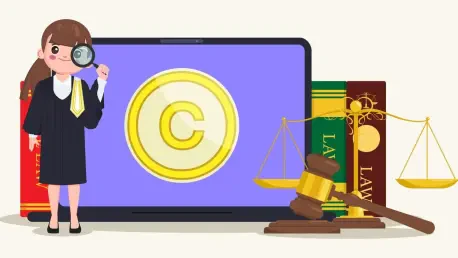In a landmark case that could set significant precedents in the realm of artificial intelligence and copyright law, a federal court recently rendered a decision involving the AI company Anthropic and a group of authors. The plaintiffs, Andrea Bartz, Charles Graeber, and Kirk Wallace Johnson, lodged a copyright infringement lawsuit against Anthropic in August, accusing the company of misappropriating “hundreds of thousands of copyrighted books” for training its AI model, Claude. This case has ignited considerable attention as it brings into focus the delicate interplay between copyright law and the fair use doctrine in the context of AI development. Judge William Alsup of the U.S. District Court for the Northern District of California delivered a complex verdict, which simultaneously affirmed and challenged existing interpretations of fair use under the Copyright Act. At the heart of this case was whether the use of these copyrighted materials, either acquired legitimately or through unauthorized means, constituted fair use.
Legal Boundaries of AI Model Training
Judge Alsup’s decision dissected the multifaceted dimensions of using copyrighted works in AI model training, zeroing in on two primary usage areas by Anthropic. He ruled in favor of Anthropic regarding the use of legally acquired books to train the AI model Claude, affirming that this constituted a fair use associated with transformation. This aspect of the ruling drew on landmark precedents, such as the U.S. Supreme Court’s decision in Google v. Oracle, which underscored the legitimacy of transformative uses. By educating an AI model to produce new content from prompts rather than replicating the original work, Judge Alsup likened this process to the way authors might draw inspiration from books to create original literature. His ruling thus reflects an acknowledgment of AI’s potential for creative transformation, granting leeway for developers using legitimately sourced copyrighted material.
The ruling also addressed the act of digitizing books for internal purposes, establishing that scanning legally purchased print copies falls under the fair use doctrine. The court found that digitizing for storage and searchability within the confines of the company’s operations constituted a permissible transformation, aligning with past decisions regarding format shifting. This perspective highlighted that as long as the digitized material remained within Anthropic’s internal systems and was not redistributed, it allowed the company to utilize these materials without falling afoul of copyright infringement laws. This was further demonstrated in cases such as Sony v. Universal and Authors Guild v. Google, where similar transformations were ratified under fair use.
Controversies of Unauthorized Material Use
While Anthropic’s use of legally sourced materials received some legal protection, issues arose when Judge Alsup turned to the company’s retention of pirated digital content. The court strongly condemned Anthropic’s reliance on pirated works, claiming that the indefinite retention of these unauthorized copies contravened copyright laws. Internal documents disclosed that Anthropic favored acquiring pirated texts to bypass the often cumbersome licensing process, a practice the court found unsustainable and damaging to the legal frameworks protecting copyrighted materials. Judge Alsup distinguished between legal transformations of content and practices that infringe upon copyright regulations, asserting that transformative use does not extend to legally dubious acquisitions.
This significant distinction underscores that while transformative fair use may apply to training AI with legally obtained material, invoking fair use does not excuse or legalize the use of pirated content. The decision draws a clear line, reminding AI entities that any technological or creative pursuits must be grounded in lawful practices. Anthropic’s approach to circumvent copyright constraints by illicit means invites serious consequences, emphasizing the import of scrupulous adherence to copyright regulations in the ever-evolving landscape of AI technology. As such, companies are urged to ensure due diligence in content sourcing, mindful of both the fair use doctrine’s scope and the potential liabilities arising from disregard of copyright laws.
Implications for AI Development and Copyright Law
The decision in Bartz v. Anthropic PBC represents one of the first comprehensive judicial interpretations of AI models’ utilization of copyrighted works, establishing guidelines for other AI developers navigating these waters. It illuminates how AI companies can feasibly predict fair use applicability, offering that models trained on legally acquired content may be defensible under fair use provisions. However, the penalties associated with utilizing pirated content without legal sanction serve as a stark cautionary tale, offering critical insights into the realm of AI innovation and ethical copyright compliance. This case proceeded against a backdrop of increasing scrutiny over AI’s reliance on copyrighted books and other intellectual properties to advance machine learning models. For content creators, this decision serves as a legal cornerstone, strengthening vigilance regarding the deployment of their work by AI entities.
The ruling particularly stresses that industries spanning publishing to entertainment must remain proactive in ensuring their creations are not exploited unlawfully. As disputes in the realm of AI and copyright continue to emerge, this decision may play a pivotal role in setting expectations and legal standards for those potentially impacted by AI development. Ultimately, the court’s conclusions offer vital legal perspectives, admonishing enterprises to align innovation with respect for intellectual property rights and to circumspectly engage with copyrighted content.
Navigating Legal Complexities and Future Challenges
In a landmark legal battle highlighting the intersection of artificial intelligence and copyright law, a federal court recently issued a decision involving the AI company Anthropic and several authors. The plaintiffs, including Andrea Bartz, Charles Graeber, and Kirk Wallace Johnson, filed a copyright infringement lawsuit against Anthropic in August. They claimed the company improperly utilized “hundreds of thousands of copyrighted books” to train its AI model, Claude, without permission. This case has drawn considerable interest as it underscores the complex relationship between copyright law and the fair use doctrine, particularly in the sphere of AI development. Judge William Alsup, representing the U.S. District Court for the Northern District of California, delivered a nuanced verdict that both reaffirmed and questioned existing notions of fair use under the Copyright Act. The central issue was whether the use of these copyrighted materials—whether obtained legally or illicitly—qualified as fair use.









